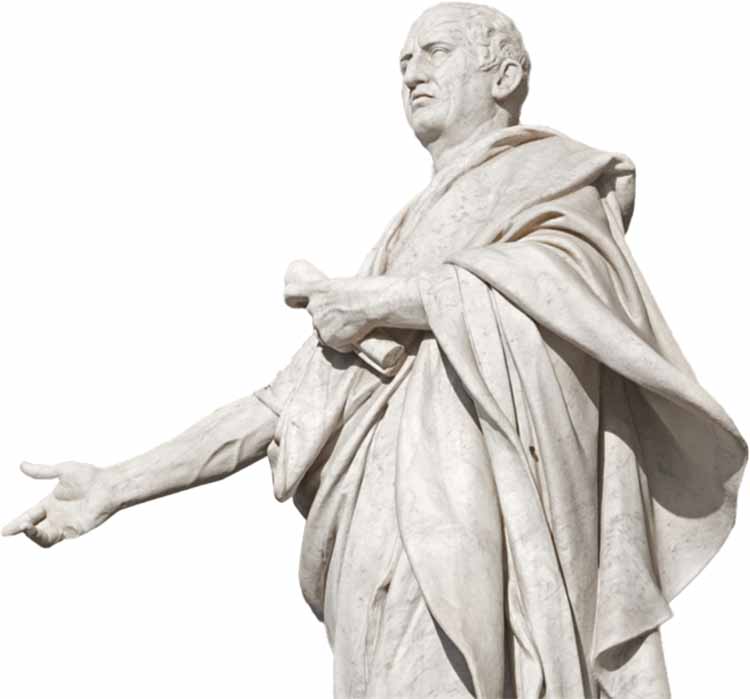
Letters From Cicero To Atticus: Insight Into The Lives Of Roman Scribae
“Every man can tell how many goats and sheep he possesses but not how many friends”. Marcus Tullius Cicero Titus Pomponius was neutral both in character and in policy. Perhaps this was his natural disposition or maybe it was the enduring fear and threat that he had experienced during the violent Sullan proscriptions, but whatever the cause, Cicero saw his friend Atticus as trusted, fair minded and safe – and in Republican Rome these were rare and highly valuable commodities. The cognomen ‘Atticus’ was a personal title that he used reflecting the 20 or so years that he spent in Athens – Atticus – the Athenian. Largely friends with everyone, this was less due to any emotional need for a social network and more to do with an intellectual interest in Epicureanism as a philosophy and his engaging personality. As important as anything was that he maintained a position where he was a threat to no one.

The Young Cicero Reading by Vincenzo Foppa (1464) (Public Domain)
It was due to his travels away from Rome, a place he visited, but rarely stayed for any length of time, that one finds Cicero’s letters, tracking Atticus down in his various pursuits or homes as he moved around the growing Roman world, watching events from a safe distance and doing his own share of writing about Roman history, how to manage a large fortune and his Epicurean philosophy. Central to Epicureanism was, and is, the pursuit of pleasure and the avoidance of pain. For the Greek philosopher Epicurus, who founded his teachings around 300, the essence of this world view is summed up in a short poem by one of his followers Philodemus: “Four part cure: Don’t fear God, Don’t worry about death; What is good is easy to get, and What is terrible is easy to endure”.
This was not membership of a philosophy devoted to a hedonistic lifestyle – far from it – it was more a value judgement in everyday life about avoiding those things that bring pain and suffering and instead realizing the true meaning of life, which is to enjoy the opportunity, therefore, the relevance of what Atticus felt and believed shaped his relationship with Cicero and thus permeated his responses to Cicero’s letters. Often Cicero read with frustration what seemed like childlike innocence on the part of Atticus when compared to the daggers and cuts of political life in Rome, and responded tussling with Atticus over his advice and sometimes showing his irritation that he did not see things his way. But, despite occasional friction, the letters show their close emotional relationship – something that had begun when they were schoolboys and Cicero knew well what depth Atticus had as a person.
The 1901 edition of The Correspondence of M.Tullius Cicero by Robert Tyrell and Louis Purser captures succinctly why it would be a mistake to view Atticus as someone without a real presence: ‘It is easy to be less than fair to a man who made so bland a success of safe living in troubled times and who, unlike Montaigne, has left no self-portrait to engage posterity in his favour. There was more in Atticus than “the quintessence of prudent mediocrity”.’ One should remember that, while Cicero has naturally always been the main focus, just as the nearly 900 letters of Cicero provides one with an invaluable insight into the life of a key Roman figure of the Republic – so the responses of Atticus tell a huge amount about an observer of the events in Rome and life in the Republic.
Of the total number of Cicero’s letters that have survived, 416 were to Atticus, and a further 419 to one or other of the 94 different friends, contacts or enemies that are immortalized in his correspondence. No-one has any idea of how many further letters Cicero drafted in his lifetime – undoubtedly thousands which are now lost to history. Through those that are available it is possible to hear Cicero’s voice dictating to his various scribae – no doubt each specializing in their own types of letters and each trustworthy with the messages he was sending so privately. It is very possible, with time and peace to reflect, to sense the complex nature of his character and personality, his humour, intellectual capacity, political astuteness, fears and his underlying softness – perhaps feet of clay in a world of granite majesty.

Cicero, Palazzo di Giustizia (Augurmm/CC BY-SA 4.0)
The Erosion of the Mos Maiorum
Cicero also displays the aspects so dear to him and all conservative Romans of the mos maiorum – the founding and guiding principles of what it meant to be a Roman. Translated literally as ‘the ways of our ancestors’, it is a recurring theme for Cicero to lament the slow erosion of Republican morals and values through his letters; through his speeches and books shines his commitment to fidelity; fides: piety and devotion towards the gods; pietas: proper performance of rituals and customs; cultus: self-control and self-discipline; disciplina: virtue and knowing what is right and what is evil; virtus: dignity, honour and esteem shown in service to the state; dignitas and auctoritas. These are the values of a society that had developed over a 600-year period and that generations of Romans had died to protect and lived their lives by. One might well ask what a modern day mos maiorum looks like and whether the young are taught the history and duties of citizenship well and are standing the tests of current times.




